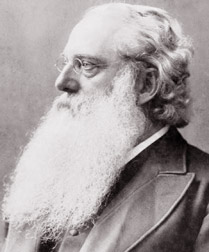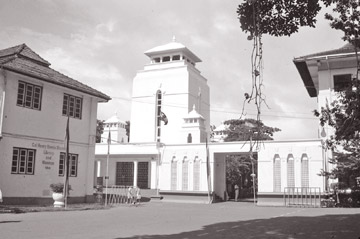|
Olcott Oration - 2011:
Role of individual in national development - Ananda can show the way
Professor Chandana Wirasinghe
I am most honoured, greatly honoured, indeed distinctly honoured to
be invited to present the Olcott Oration for 2011, this special year in
which we celebrate the 125th anniversary of the founding of Ananda
College by Colonel Henry Steele Olcott. I cannot think of a higher
honour that my school could have conferred on me.
|

Colonel Henry Steele Olcott |
The values that Ananda College, along with my parents, instilled in
me gave the foundation on which I have built my life; thus I accept this
invitation with humbleness, with gratitude, and indeed with pride, as
well as great respect for the others that could have been invited to be
the orator. I can only wish that my father, P. A. Wirasinghe, who was
Vice Principal of Ananda College for many years, and my mother, Pearl
Wirasinghe, who was a legendary teacher at Visakha Vidyalaya, could have
been here. My three daughters, two sons-in-law, two grandsons and two
granddaughters could not be here today. But I know that they are here in
spirit; indeed my daughters were kind enough to provide advice on this
oration for me. We have no sons. But if we did, they would surely have
spent at least a few semesters at Ananda College as visiting students so
they could absorb some of the greatness of this institution!
Thesis
It is important for all of us to reflect on national development in
Sri Lanka at this crucial time in our history. The country is doing very
well despite being paralyzed by a civil war for about 30 years. A good
number of our citizens are incredibly productive people. However, I
believe that we can and must contribute ideas as to how national
development can be achieved through individual actions. My main thesis
is that individual citizens play the most crucial role in developing a
country. To quote Einstein, "All that is valuable in human society
depends upon the opportunity for development accorded the individual".
My associated thesis is that such citizens are produced through the
educational process.
Colonel Henry Steele Olcott
I would like to consider the life of Colonel Olcott in some detail at
the outset, not because we do not know much about him, but in the spirit
of what lessons we can learn from his life, I must acknowledge that many
of my learnings came from reading his biography: 'Yankee Beacon of
Buddhist Light' by Howard Murphet (1), Olcott Thuma (in Sinhala) by Lal
de Mel (2), communications (3) with the archivist and staff at New York
University that Olcott attended, as well as multiple web postings.
|

Ananda College, Colombo |
The Olcott family motto was 'Vigilate' or 'be watchful'. That is
encompassed within the great Buddhist motto: 'Be Mindful.' Being mindful
of all that we say or do is crucial for development. Olcott, a 7th
generation American, was born on August 2, 1832, the name Steele
following the custom of giving the mother's maiden name to the 1st born
son. My research uncovered that Olcott attended New York University for
three years from 1847 to 1850; not for one year as previously thought.
He lived at 30 Clinton Place in New York from 1847 to 1849 (now 8th
Street between Bowery W and 6th Ave) and in Gramercy Park from 1849 to
1850 (3). Olcott did not graduate from New York University and left due
to financial hardship experienced by his family. Despite this setback,
he did not feel sorry for himself; instead Olcott worked as a farmer,
studied scientific agricultural techniques, and later opened an
agriculture school. The lesson to be learned is that Olcott never ever
gave up and learned to study on his own. Olcott's first book, one on
sugar farming, was published when he was in his mid twenties. It is
important to note that it was his ability to write well that propelled
him on his way to being an influential man. After the farm school
closed, Olcott worked as the agricultural editor for the New York
Tribune and a British magazine. He went in disguise to the deep south of
the US to cover a controversial story about a hanging, at a time just
before the American civil war when New Yorkers were not welcome. He
barely escaped being lynched himself. Olcott thus showed that he was
willing to take a calculated risk.
In April 1860, Olcott married Mary Eplee Morgan. The couple had four
children, one daughter and three sons. Only two of the children, both
sons, survived. The Olcotts were later divorced, apparently at the wish
of Mrs. Olcott who was a devout Christian, whereas Henry was already
not. Olcott continued to support his ex-wife and children. Thus we learn
that duty was important for Olcott.
Olcott joined the Federalist forces during the American Civil war as
a Signals Officer. It is unlikely that he saw any action. According to
Murphet (1), Olcott enlisted because he strongly believed in... "(a) the
abolition of slavery (b) industrial progress and (c)the solidarity of
the nation through the continuance of the American federation." Let us
transfer that philosophy to contemporary Sri Lanka and the belief in (a)
abolition of terrorism, (b) national development, and (c)solidarity of
the historic unitary nation of Sri Lanka, and we can see why so many
fought valiantly and gave their life in the recent Sri Lankan civil war.
Olcott met some very senior army officers who were impressed by his
work ethic and honesty. He was given the rank of Colonel and appointed
as a Special Commissioner of the War Department to investigate
corruption in the Union Army. It is noteworthy that Olcott was
recognized for his honesty and given the rank of Colonel to be a fighter
of corruption. Later, Colonel Olcott was appointed to a three-man
commission to investigate the conspiracy behind the assassination of
President Abraham Lincoln. That is Olcott's closest connection to
mainstream American history. After Olcott's work for the Federal
Government, many testimonials were written regarding his... "ability,
zeal, faithfulness to duty, capacity, rapidity, reliability, and
uprightness of character," I ask you today, should not all Anandians,
indeed Sri Lankans, be educated to emulate Olcott?
Olcott - the agriculturist, Olcott - the reporter, Olcott - the
editor, Olcott - the army officer and Olcott - the special commissioner
now went back to his studies and became a lawyer in 1868. He built up
thriving law practice in New York. Can we also train Anandians and Sri
Lankans to continue to educate themselves and be ready for, and seek,
career changes that inevitably come if one wants to be successful.
Olcott developed a belief in ... 'spirits, seances, mediums' and
entities called 'elemental spirits', i.e. entities that had not yet been
born in the conventional sense, though he tried to investigate them with
scientific methods. He came under the influence of a Russian woman
called Helena Blavatsky who claimed many super natural powers. More than
a decade later, the British based Society for Physical Research who
investigated her called her an 'imposter'.
This interest in the occult by Olcott and many other prominent
Americans led to the formation of the Theosophical Society in 1875 with
Olcott as the President. 'Theosophy', probably a combination of
'theology' and 'philosophy', had no special meaning. In his inaugural
address Olcott said the following: 'This society consecrates itself to
... the study of truth, ... and binds itself to allow nothing to stand
in the way. Come well, come ill, my heart, my soul, my mind, my strength
are pledged to this cause' (1). We owe it to this great man to follow
that philosophy of seeking and studying the truth even If it means
disagreeing with some of his beliefs. This is especially important in
today's Sri Lanka where even the educated classes are increasingly
filled with superstition, what the Buddha called Mithya-drushti, or
wrong beliefs.
By late 1876 the American Theosophical Society was dwindling away
with only the Colonel and Blavatsky being active. However, a British
branch had been formed. The Society was under attack from various
sectors of American society including organized religions and
scientists. Thus they decided to move the Society to India. Olcott
obviously had a World Outlook.
This move was difficult because Olcott had to ensure his teen aged
boys were well looked after, give up a lucrative law practice, and find
a way to finance himself and Blavatsky while in India. Considering his
past service, and find a way to finance himself and Blavatsky while in
India.
Considering his past services, the US President provided him with a
diplomatic passport as an honorary ambassador. They set sail from NY to
London on the ship CANADA on December 17, 1878. They set up house in
Bombay and travelled widely in India giving lectures and meeting
prominent Indian and British people. Initial financial problems in India
came to an end when 'The Theosophist' magazine was launched in 1879. We
can all learn from Olcott's entrepreneurial spirit: the founding of a
farm, an agricultural school, a law practice and a magazine.
Sri Lanka and Olcott
Olcott's arrival in Sri Lanka is well documented. He first took
notice of Sri Lanka through a report on the Panadura Vadaya which was a
three day debate between the Ven. Migettuwatte Gunananda and some
missionaries. Thus impressed, as well as concerned about the atrocities
being committed by the British, he sailed from Bombay and, after a 10
day voyage, landed in Galle on May 17, 1880. He took Pansil at a local
temple and adopted the Buddhist philosophy.
He was feted by the local luminaries and greeted as a hero. It is
said that the Panadura Debate and Olcott's arrival was the beginning of
a renaissance in Sri Lanka, parts of which by then had been under
colonial rule for well over four centuries. Colonial imperialism, the
worst 'crime against humanity' in the history of the world, as practised
for example by the lawless Dutch and British East India Companies had
been in full bloom.
To be continued |



